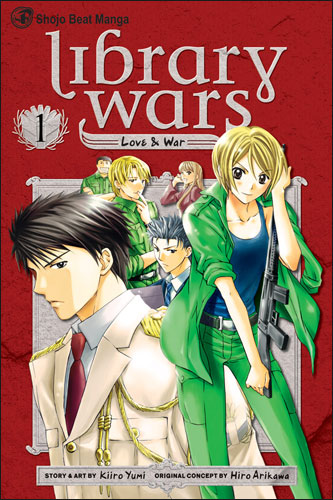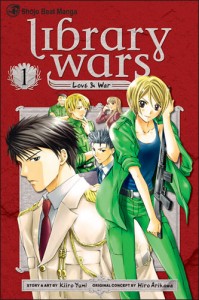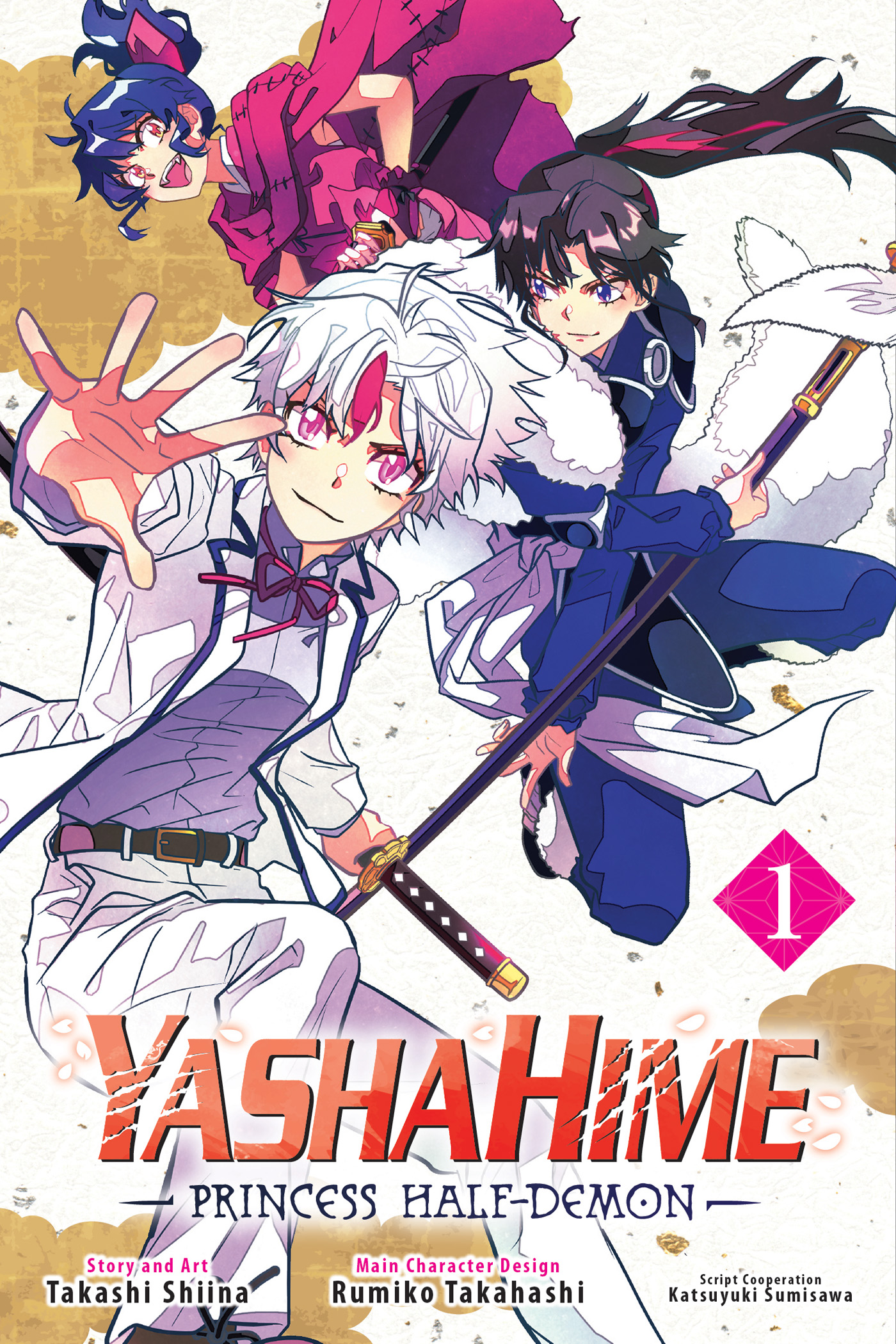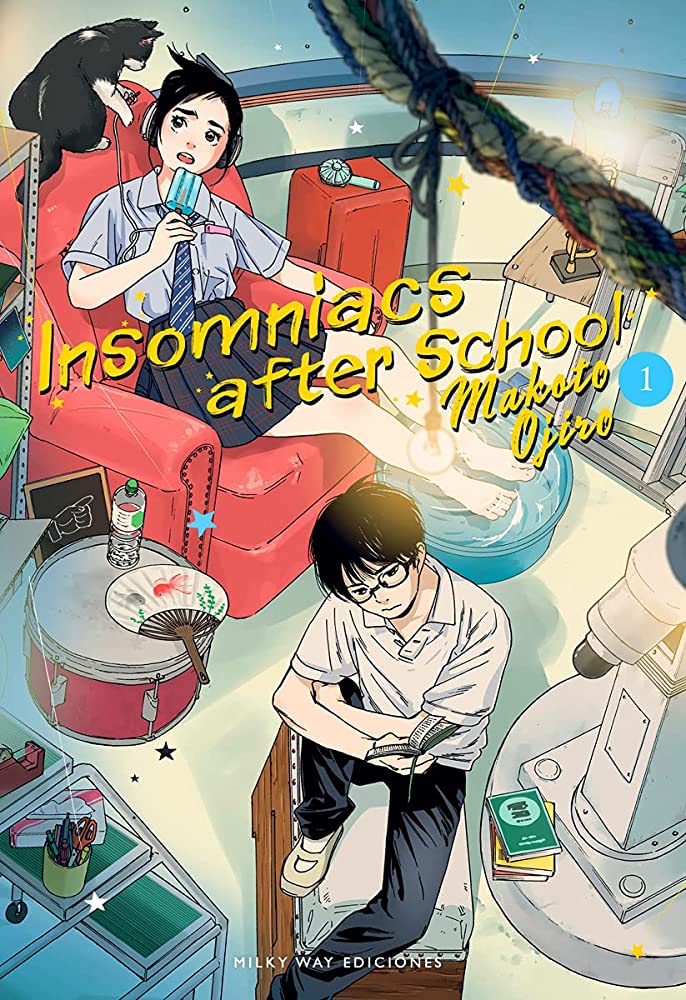If I were thirteen years old, Library Wars would be at the top of my Best Manga Ever list, as it reads like a catalog of the things I dug in my early teens: books about the future, books about women breaking into male professions, books with bickering leads who harbor secret feelings for each other. I can’t say that Library Wars works as well for me as an adult, but I can recommend it to younger female manga fans who are tired of stories about wallflowers, doormats, or fifteen-year-old girls whose primary objective is to nab a husband.
The story focuses on Iku Hasahara, a former track star and future librarian who enlists in the Library Defense Force (LDF), a paramilitary organization dedicated to combating censorship. Formed in response to the Media Betterment Act, the LDF actively challenges the national government’s efforts to remove books from stores and libraries, using weapons and strong-arm tactics when necessary. Iku is the only female recruit who can keep pace with the guys, push-up for push-up, and is the frequent target of abuse from Atsushi Dojo, a handsome drill sergeant who takes grim delight in pointing out her weaknesses. (Her mastery of the Japanese Decimal System leaves a lot to be desired.) As Iku advances through basic training, however, she begins to realize that Dojo isn’t so bad; his sometimes brusque demeanor masks genuine concern for his pupil, and a sincere desire to help her become a top-notch officer.
Library Wars‘ premise certainly invites comparisons with Fahrenheit 451. The future society depicted in Library Wars isn’t nearly as bleak or disorderly as the one Ray Bradbury imagined back in 1951, but creators Hiro Arakawa and Kiiro Yumi are just as insistent on the importance of standing up for free speech; Iku joined the Defense Forces after the Media Betterment Committee’s jack-booted thugs attempted to confiscate a book from her. (A hot guy also factored into her decision to enlist.) The MBC is as arbitrary and ruthless as the Firemen of Fahrenheit 451, working hard to restrict citizens’ access to potentially “harmful” materials, even going so far as to infiltrate libraries to weed out undesirable material.
In adapting Library Wars from novel to manga, however, Kiiro Yuki places less emphasis on the book-banning crisis and more on her characters’ relationships, preserving just enough background about the LDF’s history to justify the action sequences. That’s not necessarily a bad choice; Iku and Dojo’s banter has a pleasant, antagonistic zing to it that infuses the boot camp scenes with some playful energy. The LDF’s rationale for existing, however, often seems underdeveloped, as we don’t know what prompted the national government to pass the Betterment Act. In leaving these details vague, one could argue that Yuki is simply being true to historical fact; oppressive regimes from tsarist Russia to Maoist China have arbitrarily banned books and condemned authors in the interest of “the national welfare,” yet in the context of the Library Wars manga, that lack of specificity comes off as sloppiness. We don’t know whether censorship is having a real impact on citizens’ ability to say and think what they please; the few scenes in which we glimpse the MBC in action suggest that they’re more of a nuisance than a genuine threat to the social order.
The artwork is serviceable but not great. The character designs are about as basic as they get, with haircuts playing a pivotal role in establishing each cast member’s personality; we know Iku is a tomboy from her sensible and slightly androgynous bob, for example, while Dojo’s neat ‘do paints him as a hardcore military man. (By contrast, Sgt. Komaki, the series’ designated McDreamy character, has the kind of tousled locks that wouldn’t pass muster in the Marines.) The action scenes are hasty affairs, rendered with little respect for continuity or background detail, while the layouts often feel busy, with too many small panels and design elements hampering the visual flow.
If the censorship theme and artwork aren’t as well executed as I might have hoped, Library Wars earns high marks for having a smart, capable heroine and a smart, topical premise. Iku may not be a wonder woman, but she’s a plausible mixture of strength and uncertainty; teen girls will relate to her shifting moods, fierce temper, and high principles, even if they can’t agree whether she should end up with Dojo. And really, what’s not to like about a series that features hot guys who hate censorship but like books, libraries, and butt-kicking women? Now there’s a fantasy female readers of all ages can endorse.





Jade says:
Hmmm…Sorry Kate, but I just finished reading Library Wars and disagree with much of what you’ve said.
There’s a subtle mature spin to the book that I think would be lost on younger readers, but welcome to many adult fans of manga. Instead of wishy-washy teens unsure of their direction in life, we’re seeing young adults who know their direction, but run into some walls when adult reality smacks them in the face. Dreaming, trying one’s best, even being exceptionally skilled are shown not to be all it takes in the real working world and these are the real, adult obstacles Iku is faced with. I was also very impressed with her realistic soldier fatigues and work uniform which is stylish yet reminiscent of Secret Service or FBI agents. It’s not flashy, but it paints a picture of an adult woman. Is the overall mood light-hearted and juvenile? Sure, but no more so than any other comedy story I’ve ever experienced.
I was also very impressed with the art. It’s not the sort of style that jumps out of the page at you, but the mechanics are some of the most solid I’ve ever seen in a shojo book. Figures are logically consistent and transitions that are fully legible yet still manage to throw in some variety here and there. The characters also have a lot of distinction with a wide variety of facial structures and builds when you really look at them, but it is a bit hard to differentiate with everyone wearing the same clothes for the most part. The expressions are also spot on. Dojo’s subtle face is a real treat if you can get past Iku’s wild expressions making everyone else that much blander.
You may be right about some of the denser layouts, but I didn’t have a problem with them. One or two dialog balloons tripped me up, but otherwise I had no trouble whatsoever navigating the story. Compare these pages to something like Wild Ones or even some chapters of Nana and the legibility really shines.
Katherine Dacey says:
I dunno, Jade — I found Library Wars kind of paint-by-numbers, with a lot of capitulation to shojo formula and competent but not memorable art. I enjoyed it as a fun bit of escapism, but I didn’t think it supported a deep reading. Guess we’ll have to file this under “Agree to Disagree.”
Jade says:
Oh! Also, the MBC don’t seem like much of a threat through most of the book, but I think there’s a definite sense of foreboding that this helps to build. Iku is basically still experiencing the romantic Honeymoon of the new job and I almost got the feeling that she was consciously trying to ignore the real threat of the MBC. An incident with twelve casualties is brought up and her mind is on other things that reduces the remark to a teeny little note at the corner of her consciousness. The scene with the temporary head librarian at the Udon shop is also dripping with nasty foreshadowing, but she just isn’t putting the pieces together, she reduces it to a juvenile ‘bad guy’ situation. Whatever the true threat is, she’s just reducing it to bad guys, princes and trying her hardest instead of a state that’s decriminalised library defense force murders. The signs are there, but she just doesn’t have her head in the game…at least not as far as we’re reading.
Jade says:
What!? How dare someone have a different opinion!! :3
I suppose I can agree on the capitulation to shojo formula, but I’m not sure how much it’s actually hurting anything else. I suppose it’s just too early to judge a book with this many charms and flaws too harshly or sweetly.
I still hold that it is far better than Wild Ones. I read Vol. 9 of that just before LW.
Katherine Dacey says:
You made it through nine volumes of Wild Ones? I’m impressed! I bailed out on that series a while ago, even though I loved the goofy yakuza thugs.
I’ll make you a deal: I’ll give Library Wars a few more volumes before I make any more sweeping pronouncements about it and if it grows on me, you’ll be the first to know. You’ve certainly given me a lot of food for thought!
Jade says:
Haha, I know, I know; Wild Ones is my go-to book to fill out four-for-three deals when I can’t decide on anything else. Looking back, I’m surprised I kept up with it though. I have no clue why I enjoy it, possibly because the male lead is slightly more appealing than they tend to be these days. Or maybe knowing the heroine is in a position that could cause him grievous bodily harm if he crosses the line too much gives the creepy shojo misogynist prince thing some imaginary boundaries that tones it down. I can read about egotistical pretty boy teaching plain girl not to get too uppity with no reprisal in every other shojo title.
You know what would make a great replacement? Stolen Hearts…
Anyhow, I’ll try to look at Library Wars more objectively too. I have to be seeing more than what’s there if I’m missing this many of the flaws you saw in it. I think, as an artist, I just tend to gauge more weight in possibility and…er…evocativeness?…than is appropriate for proper critical analysis.
Ultimately though, I think I’m seeing standard shojo fare with a fresh twist and you’re seeing a fresh idea burdened by shojo cliches.